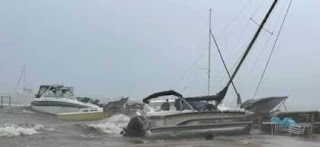October 23, 2025
One Dead in Boat Fire Near Falmouth, Massachusetts
October 19, 2025
Captain Life Lost as Sportfish Capsizes in Oregon Inlet North Carolina
August 5, 2025
Mazu Yachts Founder Lost Following Collision Near Marmara Island
June 22, 2025
Eight Dead in Sudden Storm on Lake Tahoe California
April 23, 2025
One Woman Dead in Yacht Fire on Stella River Udine Italy
February 22, 2025
Two Women Killed in Newark Boat Fire
December 24, 2024
One Dead Five Injured as Boat Explodes in South Florida Marina
November 6, 2024
One Man Injured as Sport Cruiser Goes Ablaze Near Delimara Malta
October 12, 2024
Hurricane Milton 2024
September 29, 2024
Hurricane Helene 2024
Hurricane Helene was a large, deadly, catastrophic, and fast-moving tropical cyclone that was the strongest on record to strike the Big Bend region of Florida. The eighth named storm, fifth hurricane, and second major hurricane of the 2024 Atlantic hurricane season, Helene developed gradually from a mid-September disturbance in the western Caribbean Sea within a broad area of low pressure known as the Central American gyre. By September 24, the disturbance had consolidated enough to become a tropical storm as it approached the Yucatán Peninsula, receiving the name Helene from the National Hurricane Center. Favourable conditions led to the cyclone's gradual intensification, and it became a hurricane early on September 25. More pronounced and eventually rapid intensification ensued as Helene traversed the Gulf of Mexico the following day, reaching Category 4 intensity on the evening of September 26. Late on September 26, Helene made landfall at peak intensity in the Big Bend region of Florida, near the city of Perry, with maximum sustained winds of 120 knots. Helene would weaken as it moved quickly inland before degenerating to a post-tropical cyclone over Tennessee on September 27. the storm then stalled over the state before dissipating on September 29. In advance of Helene's expected landfall, the governors of Florida and Georgia declared states of emergency due to the significant impacts expected, including very high storm surge along the coast and hurricane-force gusts as far inland as Atlanta. Helene also caused catastrophic rainfall-triggered flooding, particularly in western North Carolina and eastern Tennessee. Hurricane warnings also extended further inland. As of September 30, a total of 120 deaths have been attributed to Helene.
August 24, 2024
One Dead as Riva Yacht Collides with Fishing Boat in Mallorca
August 22, 2024
Hurricane Ernesto 2024
July 27, 2024
One Man Lost as Boat Capsizes on Chicago Side of Lake Michigan
July 13, 2024
One Dead One Missing in Sportfish Tanker Collision in Lydia Channel
July 11, 2024
Hurricane Beryl
Hurricane Beryl was a deadly and destructive Atlantic hurricane that impacted parts of the Caribbean, the Yucatán Peninsula, and the Gulf Coast of the United States, forming on 28 June and dissipating eleven July 2024. It was the earliest-forming Category 5 hurricane on record and the second such storm in the month of July, the other being 2005's Hurricane Emily. Beryl was also the strongest hurricane to develop within the Main Development Region of the Atlantic before the month of July. The second named storm, first hurricane, and first major hurricane of the 2024 Atlantic hurricane season, Beryl broke many meteorological records for the months of June and July, primarily for formation and intensity. Beryl caused catastrophic damage on Grenada's northern islands of Carriacou and Petite Martinique and on several of Saint Vincent and the Grenadines' southern islands, such as Union Island and Canouan. In Venezuela, six people were killed and one person missing. Sustained damage was also recorded in the Yucatán, although it was generally limited to trees, power poles, and roofs, as well as some flooding. In the United States, the state of Texas experienced severe flooding and wind damage, with reports of at least 22 dead in the Houston region. Additionally, the outer bands of the hurricane produced a tornado outbreak, with tornadoes confirmed in Texas, Louisiana, Arkansas, Kentucky, Indiana, New York, and Ontario. As of July 18, a total of fifty fatalities have been confirmed, and preliminary damage estimates are more than US$6.2 billion.
In Texas the damage was minimum though some boats and yachts still suffered to Beryl storm surge, with this Azimut 54 ending sinking on eight July.














































